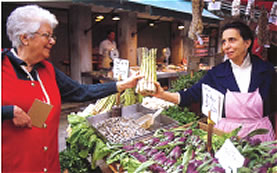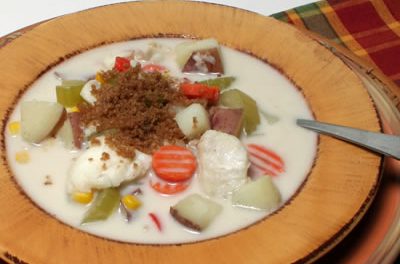Looking, Asking, Selecting
A skeptic might see room for deception, but on one who tries to practice deception of this kind would have steady customers for long in Venice. Venetians know their produce and their fish, they know the places these come from, they know their market and its vendors. Nothing is accepted unquestioningly.
To understand how they shop, let us follow a svelte, smartly dressed woman who is going from stall to stall, peering intently only at radicchios and lettuces, and rucola, and onions. It is a sultry summer morning and evidently she has decided that all she is going to make for lunch is a salad.
To the various greens and sweet onions that she is looking for, she will probably add chunks of very good tuna packed in olive oil; some anchovies that she has bought loose under salt and will clean, fillet, and soak in olive oil herself; and a hard-boiled egg or two. Stay on her heels and eventually you'll see that she settles on what appears to be the most promising of the stalls, where she waits her turn.
When it comes she will not order until she has asked the vendor, and received reassuring answers to, such questions as, "This isn't yesterday's radicchio, is it? Is the rucola really wild, not cultivated? Is that S.Erasmo [one of the farm islands] lettuce? Is this truly - veramente - Tropea onion [very sweet red onion from Calabria, in the south]?" Not wanted to lose esteem by showing untoward credulity and shaking her head as if questioning the veracity of the replies, she will finally commit herself: A quarter pound of that please, and a head of the other, one of those, and a bunch of this.
If it seems like a lot of trouble to take over a salad, it is food that she is going to put on the table, isn't it, and what could be more important? There are no decisions she will make, either that morning or in her life, to which she is likely to give more deliberate thought.
Knowing Your Market
When I have visitors whom I take to see Rialto, I know in advance that some will remark on how lucky I am and what would I ever do without such a market. I would do as I have always done and as I still continue to do what I am cooking away from Venice. I'd shop carefully, wherever I happened to be.
An encouraging development in America is the appearance of farmers' markets in cities and the proliferation of farmstands near agricultural communities offering vegetables and fruit that are local, nostrani. Some of the produce I have bought at such markets and farmstands, although limited in variety, need not envy - and sometimes may even surpass - the freshness and flavor of what I can get at Rialto.
It has been my practice, however, whenever I am testing a recipe that I hope to publish or cooking for a demonstration either live or on television, to use only products that would be available to most of my readers and my audience, and thus I often rely on selective shopping at the local supermarkets. A genuine farmers' market can certainly provide better access to recently picked produce, but if you can't get to one when you need to cook, it would be foolish to wring your hands in discouragement and dismiss a supermarket's resources. They can be quite valuable if you do as my neighbors do at Rialto: Get to know the market.
Not all supermarkets are the same; look for the best one in your area and be willing to travel a little farther, if necessary, to get to it. Rely on your eyes rather than on a shopping list. Even in the best produce department, the produce is not of identical freshness and quality every day. Take a long look before you decide.
You have an immense advantage over the shoppers at Rialto: You can touch, feel, and choose. Do so. Bear in mind that moisture is an essential component of freshness and when a vegetable's fibers begin to lose it, just as our skin does when it ages, the vegetable deflates and begins to sag.
If you had eggplants in your plans, make sure their stem is a bright green, their skin lustrous and taut, and that they don't feel too heavy in the hand, which would mean they have too many seeds. Should they be otherwise, change your plans.
Green beans should be even and clear in color, with no mottling. They should snap sharply.
Test an artichoke by bending back on of its leaves. If it is fresh it will offer resistance and remain erect; if long in the tooth it will yield limply.
Asparagus tips should be firmly closed.
Broccoli florets must be tightly clustered and bright green, with no trace of yellow.
A pea pod should be dewy green with no spots. Crack one open; it should open crisply. Taste a pea; it should be juicy and sweet, not starchy. Bell peppers should be very firm, their skin tightly stretched, with no bruises, punctures, or soft spots.
For Italian cooking, mature peppers - that is, red or yellow - are preferable to the green ones, which are unripe.
Zucchini ought not to be overgrown. Their flavor is sweetest when they are young, that is, small. Their skin should be glossy, and they must absolutely not droop. Choose them all of a size, so that the zucchini will cook uniformly.
Garlic heads should be as heavy as possible. They get lighter as they dry out, and as they dry out they become sharper.
If you can help it, do not buy what you won't be able to cook very soon. There is no point in making the effort to bring home the freshest possible vegetables and then keeping them in a refrigerator for a week.
The Venetian men and women who go to Rialto every day know their market as though it were their own backyard plot. You can get to know your markets and your farmstands with the same thoroughness and soon you will be able to detect what has been trotted out of cold storage for several days running and what, on that day, has come in fresh.
The people behind the stands or at the farmers' market are easy to approach and they are a priceless source of knowledge about their products. But supermarkets too have people who know. I always try to make the acquaintance of the manager of the produce department, of the butcher, and of the man in charge of the fish. It's in their interest to satisfy a steady and educated customer. I have found good butchers at many supermarkets who will cut the meat as I want it or, if they don't have it, get it for me, often just in a day. Leave your telephone number with the fishmonger if what you are looking for isn't there in the case, and on the day it comes in, you can be the first to know. The only things I have never been able to find in a supermarket are a really first-rate piece of cheese in good condition and a superior olive oil.
If you are in an area that has specialty food shops, you can apply the same "look, ask and select" strategy there. Some shopkeepers and clerks are unforthcoming, but generally they are grateful to establish a relationship with someone who is as interested as they are in the products they sell. One of the words to which the electronic age has given wide circulation is "interactive." I am not quite sure I understand how it works when applied to a computer program, but interactive is exactly what thoughtful food marketing should be, whether you practice it at Rialto or at a suburban supermarket.
Source: This article is excerpted, with permission, from "Marcella Cucina" by Marcella Hazan. Since the publication of her first book, The Classic Italian Cookbook, more than twenty years ago, Marcella Hazan has been hailed as the queen of Italian cooking in America. Photograph by Alison Harris.








